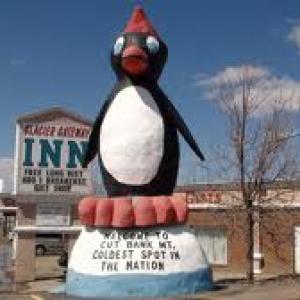 Joseph Shelton is a freelance writer who graduated from Montana State University with a degree in English Literature. He lives in Bozeman, where he enjoys hiking, reading, and being a misunderstood artist-type.
Joseph Shelton is a freelance writer who graduated from Montana State University with a degree in English Literature. He lives in Bozeman, where he enjoys hiking, reading, and being a misunderstood artist-type.
The movie "Cut Bank", a quirky indie film set in our very own coldest place in the contiguous United States, comes out very soon indeed.
If you haven't heard of it, "Cut Bank" stars Liam Hemsworth, John Malkovich and Teresa Palmer, and is an indie noir. Perhaps, as the Missoulian recently pointed out, the closest analog is to "Fargo", now an acclaimed TV show as well as an Oscar nominated movie (and in this humble reviewer's brilliant opinion, one of the best movies of the 90s).
I for one, am very excited to see the film. When I lived on the Hi-Line as a kid we would often travel through Cut Bank. The enormous penguin and Cut Bank's almost entirely unironic embrace of their rather fearsome weather left a striking impression.
But as you may have realized, Hollywood has a somewhat limited range of stories to tell, and it seems to me the only one they are guaranteed not to tell is about the real Cut Bank. Generally devoid of murder, Cut Bank feels sleepy, pleasant, and warm despite the weather.
The story of our film: Dwayne, a small town kid with outsized dreams, gets his chance to lead the city life after a chance encounter. But is it good luck, or bad (given the genre of rural noirs, probably bad)?
The most promising thing about the film is that the script was featured on the so called "black list", a yearly compendium of the finest un-produced scripts floating around Hollywood.
The real question is what it will do for Cut Bank, for better or for worse. Will it increase movie tourism in the way that the Brainerd, Minnesota statue of Paul Bunyon featured prominently in "Fargo" is now swarmed by film (and now tv) lovers? And is that good for Cut Bank?
As a Montanan I am curious, if wary, of what could be a somewhat stilted portrayal of small town life in our beautiful state. But as a film lover (and Fargo lover!) I am very excited for the prospect of a more local crime story, likely with a streak of black humor.
Hopefully Montana's getting a filmic renaissance. With "Nebraska", last year's brilliant Oscar nominee partially set in Billings, and "Longmire", the mystery show set in Northern Wyoming and parts of Montaana, the Last Best Place is getting the most star turns since the70s, when writers like Thomas McGuane and film makers like Arthur Penn were trying to show the country what we already know: there is no place like (our) home.
 A Bigfork man claimed that his friend's girlfriend pawned his stolen rifle.
A Bigfork man claimed that his friend's girlfriend pawned his stolen rifle.

 Glacier National Park's snowplow crew is tackling the "Big Drift" at Logan Pass on the Going-to-the-Sun Road.
Glacier National Park's snowplow crew is tackling the "Big Drift" at Logan Pass on the Going-to-the-Sun Road.